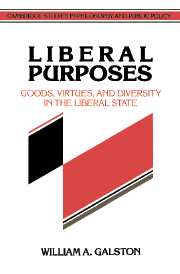Summary
If the arguments offered in Part II are correct, liberalism cannot do without, and presupposes, a nonneutral account of the human good. That this is so is apparent on three different levels: theory, individual moral judgment, and liberal social practices. As we saw in Chapter 4, even the most ardently neutralist liberal theorists end by relying on a triadic account of the human good as existence, fulfillment of purposes, and practical rationality. With regard to individual judgment (as T. M. Scanlon has argued persuasively), we assess human well-being and the claims it may entail by employing criteria of importance and urgency distinct from, and to a large extent independent of, individually defined tastes and interests. On the level of social practice, our most basic agencies and programs take for granted certain core human purposes: the protection of life against external aggression, internal disorder, and disease; the relief of abject misery; the development of essential human capacities in children; and so forth. As Michael Ignatieff puts it: “For all the apparent relativism of liberal society – our interminable debate about what the good in politics consists in – in practice a shared good is administered in our name by the welfare bureaucracies of the modern state.”
Section I of this chapter elaborates some of the principal background conditions that an acceptable liberal account of the human good must satisfy; Section II sketches the main substantive elements of such an account; and Sections III through VI explore its significance for liberal social theory.
- Type
- Chapter
- Information
- Liberal PurposesGoods, Virtues, and Diversity in the Liberal State, pp. 165 - 190Publisher: Cambridge University PressPrint publication year: 1991

